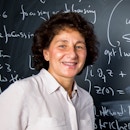How Do Waves Propagate Randomness?
- Speaker
-
 Andrea Nahmod, Ph.D.Professor of Mathematics, University of Massachusetts Amherst
Andrea Nahmod, Ph.D.Professor of Mathematics, University of Massachusetts Amherst
Presidential Lectures are free public colloquia centered on four main themes: Biology, Physics, Mathematics and Computer Science, and Neuroscience and Autism Science. These curated, high-level scientific talks feature leading scientists and mathematicians and are intended to foster discourse and drive discovery among the broader NYC-area research community. We invite those interested in the topic to join us for this weekly lecture series.
Waves are everywhere in nature. They arise in quantum mechanics, fiber optics, ferromagnetism, the atmosphere, water and many other models. Such wave phenomena are never too smooth or simple — the byproduct of nonlinear interactions. Understanding and describing the dynamical behavior of such models under certain noisy conditions or given an initial statistical ensemble and having a precise description of how the inherent randomness built in these models propagates is fundamental to accurately predicting wave phenomena when studying the natural world.
In this talk, Andrea Nahmod will start by describing how classical tools from probability offer a robust framework to understand the dynamics of waves via appropriate ensembles on phase space rather than particular microscopic dynamical trajectories. She will continue by explaining the fundamental paradigm shift that arises from the “correct” scaling in this context and how it opened the door to unveiling the random structures of nonlinear waves that live on high frequencies and fine scales. She will then discuss how these ideas broke the logjam in the study of the Gibbs measures associated with nonlinear Schrödinger equations in the context of equilibrium statistical mechanics and the hyperbolic Φ^4_3 model in the context of constructive quantum field theory. Finally, she will end with some open challenges about the long-time propagation of randomness and out-of-equilibrium dynamics.
